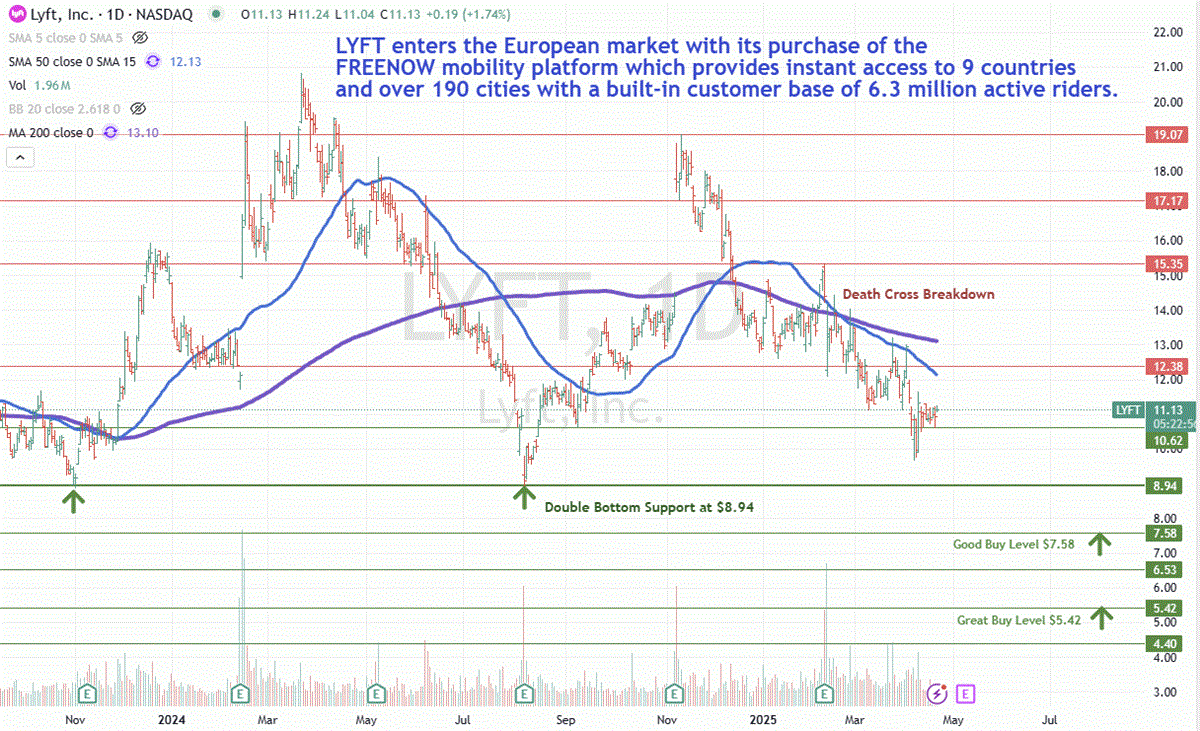Lyft Scales Into Europe: Can It Take Market Share From Uber?
Provided By MarketBeat
Last update: Apr 24, 2025

When you think of ride-hailing, Uber Technologies Inc. (NYSE: UBER) likely comes to mind, followed by the distant second player in the duopoly, Lyft Inc. (NASDAQ: LYFT). The ride-hailing/rideshare market is a two-horse race. There's Uber and Lyft, and then everyone else.
It’s not a very close race either, as Uber controls a 76% market share in the United States. However, Lyft is taking a page out of Uber’s playbook as it attempts to grow its market share outside of the United States. Its acquisition of the FreeNow mobility platform from German automotive behemoths BMW Group (OTC: BMWYY) and Mercedes-Benz Group AG (OTCMKTS: MBGAF) marks its foray into Europe with access to 19 countries.
Uber Only Has a 25% Market Share in the Global Ride-Hailing Industry
There's no question about Uber's dominance in the United States. However, when it comes to the global ride-hailing market, Uber only controls a 25% market share, followed by Lyft with an 8% market share. It only makes logical sense to target Uber where it is less concentrated outside the United States. Uber’s investment in computer and technology sector company Grab Holdings Ltd. (NASDAQ: GRAB) gives it a piece of the Southeast Asian ride-hailing market.
The FreeNow Platform Acquisition Can Double Lyft’s Annual Rides
[content-module:Forecast|NASDAQ:LYFT]BMW and Mercedes-Benz formed FreeNow in 2019 as a multi-mobility app focusing on taxi services. The app offers options for private hire vehicles, ride-hail/rideshare, eBikes, eScooters, eMopeds and car rentals. It operates in over 190 cities across the UK, Ireland, Greece, Germany, Spain, Italy, Poland, Austria, and France.
FreeNow has an active customer base of 6.3 million users. Lyft is acquiring this established platform for $197 million—a move that allows it to double its annual ride volume to over 160 million. Instead of building a presence from the ground up, Lyft is gaining immediate access to a functioning network and loyal user base, making the acquisition accretive from day one. Additionally, with 50% of taxi rides still conducted offline, Lyft has a significant growth runway as it brings more of the traditional market into the digital fold.
Lyft Hits the Ground Running After a Record 2024
Lyft’s acquisition is coming from a position of strength as it closed 2024 with record results:
- Full-year gross bookings grew 17% year-over-year (YoY) to $16.1 billion.
- Revenue rose 31% YoY to $5.8 billion.
- Net income was $22.8 million, a big improvement from a loss of $340.3 million in 2023.
- Adjusted earnings before interest, taxes, depreciation, and amortization (EBITDA) were $382.4 million compared to $222.4 million in 2023.
- Free cash flow was $849.7 million compared to a loss of $98.2 million in 2023.
- Total rides rose 17% YoY to 828 million in 2024.
- 2024 marks Lyft’s first full year of GAAP profitability.

Yet, Lyft shares are trading down over 12% in 2025. Its price-earnings (P/E) ratio looks scary at 186.2x, but its forward P/E ratio is a more modest 49.7x.
Autonomous Vehicles (AVs) Are Expected to Roll Out in the Summer of 2025
Lyft has previously announced it will be rolling out autonomous vehicles (AVs) through partnerships with May Mobility, Mobileye Inc. (NASDAQ: MBLY), and Marubeni (a Japanese company that will own and finance AVs) as early as the summer of 2025. Lyft assured drivers that there will still be plenty of opportunities. In fact, Lyft has been focused on driver-centric initiatives to keep its driver liquidity deep through retention programs like its 70% earnings commitment, enabling it to earn $9 billion in 2024.
Lyft CEO David Rysher detailed its AV plans in their Q4 conference call, “Finally, in 2025, you'll see the Lyft platform expand to include autonomous vehicles. This will come to life with our partner, May Mobility, in Atlanta, which is one of the only two players providing AV rides to the public today.
Beyond that, yesterday, we announced a partnership with Marubeni. They'll be the first to use Mobileye, other partners' Lyft-ready AV technology with the goal of deploying their fleet to thousands of vehicles on the Lyft platform over time, starting in Dallas as early as 2026 with other cities to follow.”
Where Should You Invest $1,000 Right Now?
Before you make your next trade, you'll want to hear this.
MarketBeat keeps track of Wall Street's top-rated and best performing research analysts and the stocks they recommend to their clients on a daily basis.
Our team has identified the five stocks that top analysts are quietly whispering to their clients to buy now before the broader market catches on... and none of the big name stocks were on the list.
They believe these five stocks are the five best companies for investors to buy now...
See The Five Stocks Here
78.33
+0.58 (+0.75%)
15.1
-0.04 (-0.26%)
4.76
-0.02 (-0.42%)
12.26
+0.05 (+0.41%)
Find more stocks in the Stock Screener
UBER Latest News and Analysis
 7 days ago - ChartmillMarket Monitor April 22 ( Netflix UP, Tesla, Uber DOWN)
7 days ago - ChartmillMarket Monitor April 22 ( Netflix UP, Tesla, Uber DOWN)Wall Street Stumbles as Trump Targets Fed Chair Powell Again, While Netflix Shines



